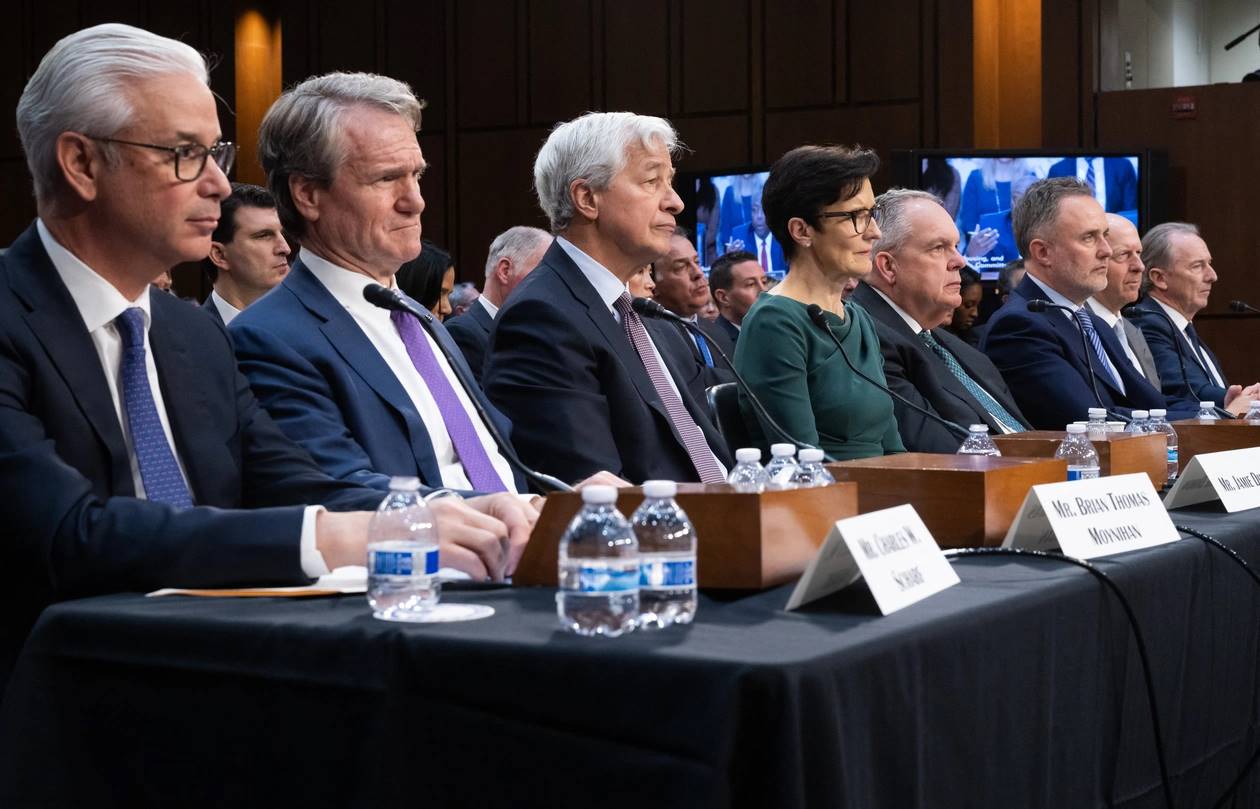By: Jasper Goodman , Michael Stratford , Declan Harty
Translated by: TechFlow
Powerful Wall Street groups are trying to block some Republican proposals aimed at promoting the development of the crypto industry.

The large amount of campaign funds invested by crypto executives for the 2024 election has had a profound impact on the banking industry. | Saul Loeb/AFP via Getty Images
The financial sector is embroiled in a lobbying civil war in Washington.
The conflict between crypto companies and banks and other Wall Street firms is escalating, mainly revolving around new digital asset rules pushed by Republican leaders. This conflict is expected to reach its climax when Congress reconvenes after the August recess.
With President Donald Trump returning to the White House, the crypto industry has achieved a series of lobbying victories, including the first legislative reform of digital asset regulation. Now, Republicans in Congress are preparing to pass a second, larger bill to promote the development of the crypto market, while Wall Street groups are starting to slow down, warning that some crypto-friendly reforms could disrupt their businesses and threaten financial stability.
Some banks are concerned that lenders may face deposit outflows as customers may turn to more loosely regulated crypto products.
But this struggle is not limited to Congress. It has also spread to some of the more obscure corners of financial policy. For example, banking groups are trying to block crypto companies from obtaining national bank charters. Meanwhile, crypto industry executives are lobbying the White House to retain the ban on banks charging fees for customer data access. At the same time, some traditional financial firms are warning Wall Street regulators that they are trying to make stock trading look more like crypto.
"Change is always difficult, especially for those who have already succeeded and are entrenched in an organization—they will always feel a bit uneasy about upheaval," said Dan Zinn, General Counsel of OTC Markets, which operates stock trading systems. "This will definitely keep everyone on their toes, whether out of a bit of fear or a bit of excitement."
This conflict highlights the dramatic shift in lobbying dynamics on financial policy issues in recent months, as Washington begins to embrace the crypto industry. The right's enthusiasm for the crypto industry has poured hundreds of millions of dollars into influence work in Washington in recent years, in some cases surpassing the interests of traditional financial firms, which usually align with most of the Republican financial policy agenda.
This month, the lobbying battle reached a fever pitch as banking industry associations called on lawmakers to retroactively amend a crypto law already signed by Congress in July through upcoming legislation, sparking strong opposition from the crypto industry. (House Republicans, after choosing to accept the Senate version of the bill, are also pushing for retroactive amendments to the bill.)
Bankers have long been skeptical of crypto. Industry leaders, including JPMorgan CEO Jamie Dimon, have previously scoffed at digital assets, and their Washington agendas have long diverged from the goals of digital asset companies.
"This is a turf war that has been going on for years, and frankly, so far, we haven't been able to get any regulatory clarity," said Ohio Republican Representative Warren Davidson of the House Financial Services Committee, a longtime ally of the crypto industry.
But for months, major industry associations representing the banking sector have only offered lukewarm public criticism of the rapidly developing Republican legislation aimed at legitimizing digital asset regulation.
After Trump signed a major bill last month that set new rules for so-called stablecoins (a type of crypto pegged to the value of the US dollar), they became more outspoken. Groups such as the American Bankers Association are now urging senators to amend the stablecoin law when they consider a second, larger crypto market structure bill next month. They want to prevent all crypto companies from paying yields to customers holding stablecoins and to repeal parts of the law that they say allow nationally chartered uninsured depository institutions to operate nationwide without proper oversight.
This concern is particularly acute for small banks, which say they could suffer losses if customers withdraw funds and place them in crypto products such as stablecoins.
"It feels like there's a move to replace us," said Christopher Williston, President and CEO of the Independent Bankers Association of Texas, the only major banking group to publicly oppose the stablecoin bill.
Williston said the stablecoin bill, known as the "Genius Act," poses a fundamental threat to "bank deposits for small lending institutions." He also added that the new bill is like "the thousand and first cut" for community banks, "after 15 years of regulatory burden following the reforms after the 2008 financial crisis."
Crypto companies that have been lobbying for the stablecoin bill for years insist the matter is settled.
Summer Mersinger, CEO of the leading industry trade group Blockchain Association, said the "Genius Act" "is an established law." "Congress debated this intensely, and the passage of this bill was a compromise by policymakers. So we really shouldn't try to go back and reopen this issue."
Paige Pidano Paridon, Executive Vice President of the Bank Policy Institute, which represents large banks, said the organization wants to work with the crypto industry to develop "clear and fair rules."
She said: "This is not a battle between banks and crypto, but a joint effort to develop rules that apply to everyone while protecting consumers and the financial system. The US financial system is built on trust, and when ordinary consumers can't distinguish between safe and unsafe, risks increase and US competitiveness suffers."
At the US Securities and Exchange Commission (SEC), traditional financial institutions have been urging Wall Street regulators to proceed cautiously as the agency considers requests from the crypto industry for "US stock tokenization." Tokenization refers to placing such assets on the same blockchain as crypto tokens like bitcoin and ether.
Proponents argue that tokenization will help accelerate stock trading globally and reduce costs. However, institutions such as the Securities Industry and Financial Markets Association and trading giant Citadel Securities, owned by major Republican donor Ken Griffin, believe that tokenized stocks should follow the same rules as the thousands of traditional stocks currently traded. Lobbyists expect the tokenization debate to play a role in the upcoming congressional debate on a market structure bill that would divide crypto regulatory authority among market regulators. Senate Republicans have vowed to pass the bill this fall.
Admittedly, the banking industry's influence in Washington remains undiminished. CEOs of major banks still win victories in Oval Office meetings, and lenders benefit from the Republican agenda of broad deregulation. Some traditional finance industry figures have also begun to favor the prospects of crypto.
But at the same time, the banking industry is dealing with a political landscape shaped by the large amounts of campaign funding invested by crypto executives in the last election—and is once again hopeful for the upcoming midterms. Crypto is a top policy priority for the White House and Trump, whose family has invested in several crypto businesses.
These dynamics have made the industry a powerful force. At the Consumer Financial Protection Bureau, crypto industry executives successfully lobbied the Trump administration to abandon efforts to work with big banks to repeal the Biden-era "open banking" rule governing consumer data sharing.
This policy prohibits banks from charging fees for access to such data, which fintech and crypto companies use to support their services and facilitate customers opening accounts and transferring funds. After intervention by crypto company executives and fintech firms, the Consumer Financial Protection Bureau (CFPB) is now reconsidering the rule instead of scrapping it entirely.
"Banks are still respected," Davidson said, adding that Republicans have worked with the banking industry to roll back some regulations enacted after 2008. "But frankly, banks do enjoy other benefits that in many ways protect them from market forces."




